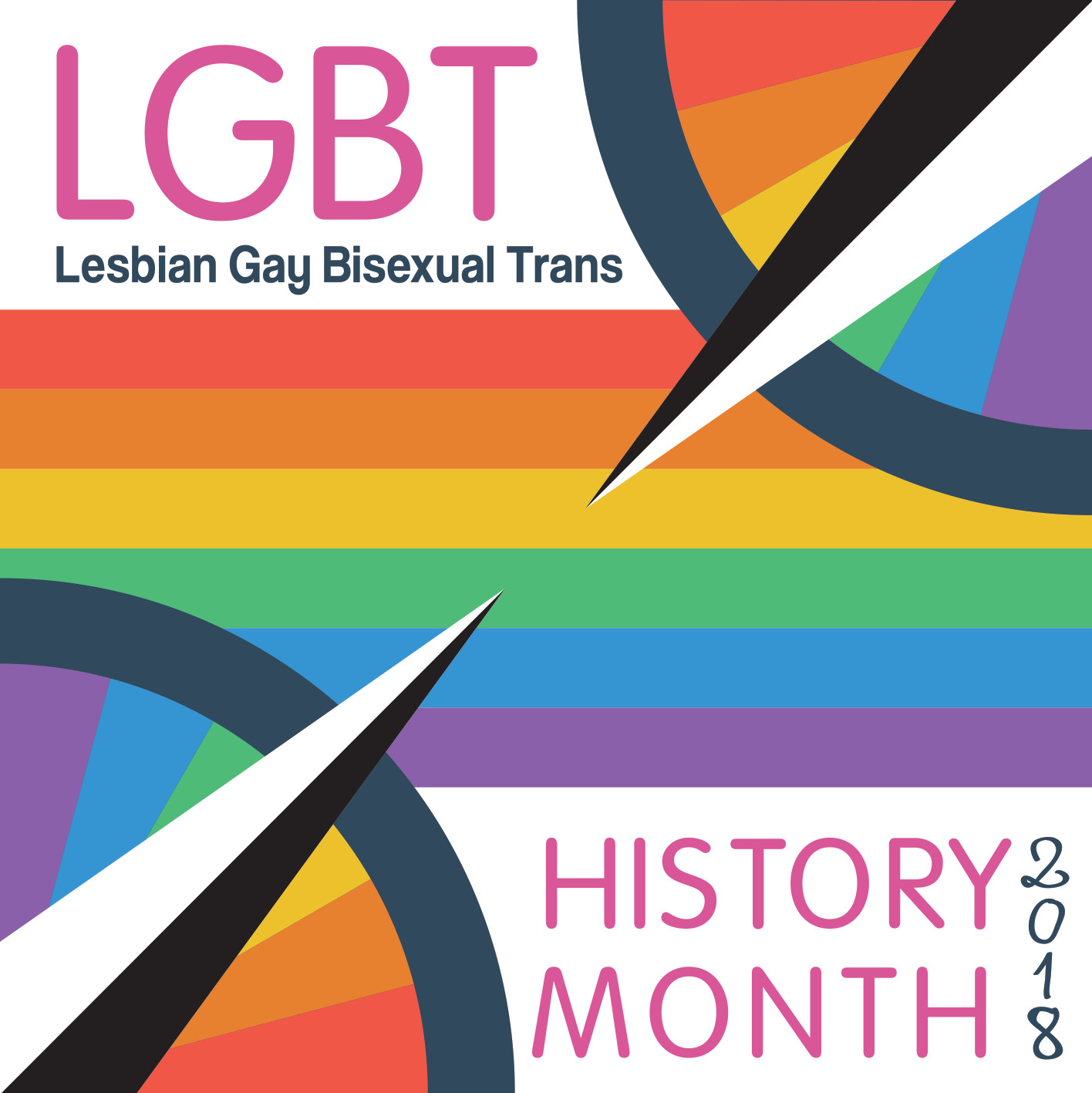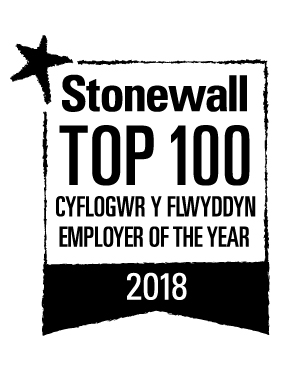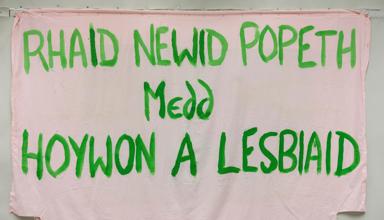Published 15/02/2018
| Last Updated 16/12/2024
 As part of our work to commemorate LGBT History Month, our guest blog comes from Norena Shopland (@NorenaShopland), the author of Forbidden Lives: LGBT Stories from Wales
As part of our work to commemorate LGBT History Month, our guest blog comes from Norena Shopland (@NorenaShopland), the author of Forbidden Lives: LGBT Stories from Wales.
When my book
Forbidden Lives: LGBT stories from Wales was published at the end of last year, one of the questions I was asked was, why did I write it?
The question wasn’t asked out of prejudice, but a genuine concern about the usefulness of a work that concentrated on a ‘minority within a minority’ with, they believed, a limited audience.
At first glance, they seemed to have a point - Wales is a small country, with just 4.8% of the UK population; and when it comes to history, is it even necessary to define every person or event as specifically English or Welsh? After all, the laws of the UK affect everyone, and everyone has more-or-less the same experiences under those laws.
The same question can be asked of other, larger minorities, who rarely exceed 20% of the population, such as black and Asian, at around 13%. Although we can relate diverse histories in themselves, is it necessary to talk about, for example, Welsh and English black and Asian people as separate entities?
Before answering, perhaps it is helpful to contemplate how you might go about finding individuals in the written record, which in itself can be a daunting task, and something I came across when writing
Forbidden Lives. One of the reasons I became interested in my country’s history of LGBT (lesbian, gay, bisexual and transgender - about 6-10% of the population depending on whose statistics you accept) was because Welsh people were being used in UK history without any reference to their country of origin. This was particularly noticeable when celebrating LGBT History Month in February, when people like Ivor Novello, the Ladies of Llangollen, Leo Abse, and many others, were being included but within a UK, or more often, English concept.
LGBT history books rarely include an individual’s country of origin, or an index references to Wales or the Welsh – something that is also true of other countries. For example, many LGBT histories will include references to, say, work on sexology done in Germany at the end of the nineteenth century, but Germany per se will not appear in an index. If you wanted to construct a German history from general histories it could not be done.
The Welsh LGBT history conundrum
All this means is that to construct a Welsh LGBT history, it was necessary to search far and wide through many mediums. An added difficulty with regard to Wales, unlike other countries such as Germany, is that Welsh people for much of the nineteenth century and beyond, are often referred to as English.
Anyway, having surmounted various hurdles to put together the lives and events which appear in
Forbidden Lives, what about the original question of ‘why go to all this trouble’? After all, some of the people I include already appear in UK histories and, whilst a number of my stories either highlight little known accounts, or are completely new, why can’t they simply be added to a UK history?
Well, they can. But there are far more reaching questions. The book has shown people from Wales have been very influential in shaping LGBT history, such as Wolfenden and the Sexual Offences Act - both of which changed society as a whole. What was it about these Welsh people that caused them to be so influential? In fact, the book has raised a whole series of questions that cannot be covered in detail here, but which concerns different types of experiences than that of England.
We also need to engage more museums, archives, schools and people in LGBT history and to do that we need to have local individuals - the more Welsh LGBT people we can identify the more engagement there will be. More engagement means more understanding of diversity and less discrimination.
So, in the end what was my answer?
Because history and politics aside, they’re rattling good stories - and after all, everyone loves a good story!
**********************************************************************************
The National Assembly for Wales is committed to promoting LGBT equality. We have been named by Stonewall as the Top Employer in the UK for LGBT people, a Top Trans Employer, and our workplace network has been Highly Commended for their work. If you would like to find out more about our work promoting LGBT equality, please contact our
Diversity and Inclusion Team.




 As part of our work to commemorate LGBT History Month, our guest blog comes from Norena Shopland (@NorenaShopland), the author of Forbidden Lives: LGBT Stories from Wales.
When my book Forbidden Lives: LGBT stories from Wales was published at the end of last year, one of the questions I was asked was, why did I write it?
The question wasn’t asked out of prejudice, but a genuine concern about the usefulness of a work that concentrated on a ‘minority within a minority’ with, they believed, a limited audience.
At first glance, they seemed to have a point - Wales is a small country, with just 4.8% of the UK population; and when it comes to history, is it even necessary to define every person or event as specifically English or Welsh? After all, the laws of the UK affect everyone, and everyone has more-or-less the same experiences under those laws.
The same question can be asked of other, larger minorities, who rarely exceed 20% of the population, such as black and Asian, at around 13%. Although we can relate diverse histories in themselves, is it necessary to talk about, for example, Welsh and English black and Asian people as separate entities?
Before answering, perhaps it is helpful to contemplate how you might go about finding individuals in the written record, which in itself can be a daunting task, and something I came across when writing Forbidden Lives. One of the reasons I became interested in my country’s history of LGBT (lesbian, gay, bisexual and transgender - about 6-10% of the population depending on whose statistics you accept) was because Welsh people were being used in UK history without any reference to their country of origin. This was particularly noticeable when celebrating LGBT History Month in February, when people like Ivor Novello, the Ladies of Llangollen, Leo Abse, and many others, were being included but within a UK, or more often, English concept.
LGBT history books rarely include an individual’s country of origin, or an index references to Wales or the Welsh – something that is also true of other countries. For example, many LGBT histories will include references to, say, work on sexology done in Germany at the end of the nineteenth century, but Germany per se will not appear in an index. If you wanted to construct a German history from general histories it could not be done.
As part of our work to commemorate LGBT History Month, our guest blog comes from Norena Shopland (@NorenaShopland), the author of Forbidden Lives: LGBT Stories from Wales.
When my book Forbidden Lives: LGBT stories from Wales was published at the end of last year, one of the questions I was asked was, why did I write it?
The question wasn’t asked out of prejudice, but a genuine concern about the usefulness of a work that concentrated on a ‘minority within a minority’ with, they believed, a limited audience.
At first glance, they seemed to have a point - Wales is a small country, with just 4.8% of the UK population; and when it comes to history, is it even necessary to define every person or event as specifically English or Welsh? After all, the laws of the UK affect everyone, and everyone has more-or-less the same experiences under those laws.
The same question can be asked of other, larger minorities, who rarely exceed 20% of the population, such as black and Asian, at around 13%. Although we can relate diverse histories in themselves, is it necessary to talk about, for example, Welsh and English black and Asian people as separate entities?
Before answering, perhaps it is helpful to contemplate how you might go about finding individuals in the written record, which in itself can be a daunting task, and something I came across when writing Forbidden Lives. One of the reasons I became interested in my country’s history of LGBT (lesbian, gay, bisexual and transgender - about 6-10% of the population depending on whose statistics you accept) was because Welsh people were being used in UK history without any reference to their country of origin. This was particularly noticeable when celebrating LGBT History Month in February, when people like Ivor Novello, the Ladies of Llangollen, Leo Abse, and many others, were being included but within a UK, or more often, English concept.
LGBT history books rarely include an individual’s country of origin, or an index references to Wales or the Welsh – something that is also true of other countries. For example, many LGBT histories will include references to, say, work on sexology done in Germany at the end of the nineteenth century, but Germany per se will not appear in an index. If you wanted to construct a German history from general histories it could not be done.






